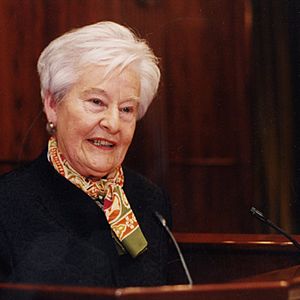Carmen Castillo García facts for kids
Quick facts for kids
Carmen Castillo García
|
|
|---|---|
 |
|
| Born | May 4, 1932 |
| Nationality | Spanish |
| Education | University of Granada University of Madrid |
| Occupation | Professor of Classical philology |
| Employer | University of Navarra |
Carmen Castillo García was born on May 4, 1932. She is a Spanish professor who taught about ancient languages and history. She worked at the University of Navarra in Pamplona. She was the second woman in Spain to become a full professor of Latin. She is also an expert on a Roman area called Baetica, which was in southern Spain.
Contents
Early Life and Education
Carmen Castillo García was born in Granada, Spain. She started her studies at the University of Granada. She wanted to learn about Classical Philology. This is the study of ancient languages like Latin and Greek, and their literature and history.
To continue her studies, she moved to the University of Madrid. There, she earned her first university degree.
In 1962, Carmen Castillo moved to Pamplona. She joined the philosophy and letters department at the University of Navarra. She started as an assistant professor. While there, she began working on her advanced degree, called a doctoral thesis.
She also helped create a special library. This library focused on subjects like history, literature, and languages. She taught classes and helped students learn about ancient cultures.
Becoming a Professor
In 1965, she completed her doctoral thesis at the University of Madrid. In the same year, she published a book. This book was about the lives of people in southern Spain during the time of the Roman Empire.
In 1969, she became an associate professor of Latin linguistics. Then, in 1970, she was appointed as a full professor of Latin philology at the University of Madrid. She worked with other important professors there. She also helped set up a library for classical philology.
Return to Pamplona
In 1972, Carmen Castillo became a full professor of Latin philology at the University of La Laguna. She was the second woman in Spain to achieve this important position.
The next year, she returned to Pamplona. She continued teaching at the University of Navarra. She held important leadership roles there for many years. She was the vice dean of the philosophy and letters department from 1973 to 1982. She also directed the department of classical philology from 1973 to 2002. In 1975, she published another book. This book was about the towns and settlements in the Roman province of Baetica.
In 1998, the University of Navarra honored her work. They published a book celebrating her career and contributions.
Teaching and Research
Professor Castillo shared her knowledge in many ways. She taught at summer courses organized by different universities. These courses helped students learn more about classical studies. She also helped develop a course on Epigraphy. Epigraphy is the study of ancient inscriptions, like those found on monuments or coins.
Areas of Study
Her research focused on two main areas. One area was Latin literature. She studied famous Roman writers like Cicero and Livio. She also looked at Roman comedies, especially plays by Plautus. She worked on translating and editing ancient texts.
Her second main area was Roman History. She specialized in Epigraphy and Prosopography. Prosopography is the study of groups of people and their relationships in history. In recent years, she has focused on the fourth century. This includes both the literature and history of that time.
Works
- Prosopographia Baetica, 1968
- Städte und Personen der Baetica, 1975
See also
 In Spanish: Carmen Castillo García para niños
In Spanish: Carmen Castillo García para niños

